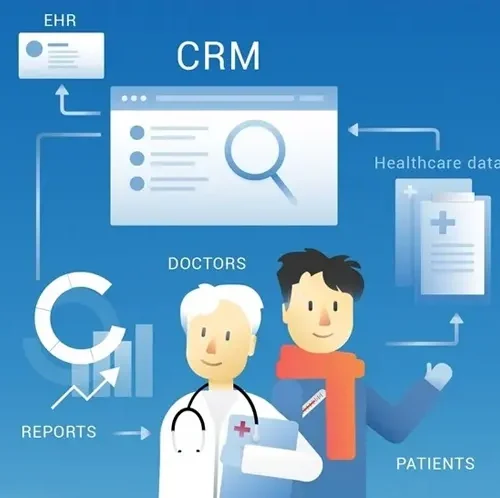Developing a hospital management system is no easy task, but it is a significant undertaking in today’s healthcare industry. This software is essential in streamlining administrative workflows, improving patient care management systems, and ensuring the smooth operation of clinical facilities.
Mayo Clinic’s research reveals that personalized medicine plans to patients’ genetic profiles in Hospital Management Systems have led to a 15% increase in treatment success rates.
So, how can we create the most powerful hospital management software? Let’s break down the process into manageable steps, even for those without extensive technical knowledge. If you need further assistance, don’t hesitate to seek the expertise of hospital management software development ideas from a custom Web Application development company.
According to data from the CDC, the use of Wearable Health Technologies in Health Management Systems has led to a 25% increase in physical activity. These Healthcare Trends are beneficial assets that can greatly enhance the healthcare experience for patients and suppliers.
But first, let’s understand what a hospital management information system is.
Hospital management software is a technology solution that helps keep records and manage all patient data and automates various aspects of hospital operations, such as billing, scheduling appointment processes, monitoring regulatory compliance, and monitoring inventory status.
To fully grasp the workflow of a hospital management system, let’s explore the key participants:
- Patients: Patient convenience is key. Patients now leverage the software used on the patient portal or connected features to schedule appointments, examine their health records, follow through their medical history, get information, and Refill Prescriptions Online. This empowers patients to take an active role in managing their healthcare.
- Healthcare providers: They manage patient care, record critical clinical data, prescribe medications, and access patient information. The software allows them to efficiently track and update patient records, ensuring continuity of care and accurate treatment plans.
- Hospital administrators: These individuals inspect the overall operation of the hospital and utilize the HMS for strategic planning, organizing and allocating resources, and conducting budgets based on seamless operational management. The software provides real-time insights into hospital operations, enabling administrators to make informed decisions and optimize efficiency.
- Get aligned with Other Healthcare partners: Finance teams and insurance companies utilize the HMS for billing, claims processing, revenue cycle management, financial reporting, and patient coverage and benefits verification. Integrating health technologies into the system can also help increase physical activity levels by 25%, according to data from the Centers for Disease Control and Prevention.
- Link with Regulatory Compliance: Supervisors rely on HMS-generated data to ensure hospital compliance with healthcare regulations, patient privacy, legal requirements, and audits.
Custom Patients Service Hospital Management System benefits:
Patients are not only looking for professional medical care but also expect high-quality service. Hospital services automation through Hospital Management Software offers a range of benefits that can significantly improve the level of patient outcomes and get a prompt response in remote settings.
Let’s explore some of the key features that can enhance the patient experience.
Automat Patient Quarry Process!
One of the features offered by hospital management software is the automatic processing of every query made by patients. This means that the system can address common questions without the need for hospital staff involvement. Patients can receive immediate answers to frequently asked questions, saving time for both the patient and the hospital staff. This not only improves patient experience but also helps to reduce wait times and streamline communication.
Easily book appointment slots:
Another feature that can greatly benefit patients is the ability to view visiting hours and available appointment slots for doctors on the clinic’s website. This allows patients to choose a convenient time and book an appointment online. By having access to real-time information, patients can easily find an appointment that fits their schedule, eliminating the need for unnecessary phone calls or visits to the hospital. This feature empowers patients and gives them more control over their healthcare journey.
Put forward SMS notifications as a reminder:
In addition to online appointment booking, hospital management software can also send SMS notifications or voice reminders to patients about their scheduled appointments. This serves could leverage as a helpful reminder, ensuring that patients don’t forget about their healthcare visits. It also allows the hospital to communicate important information about the appointment, such as any necessary preparations or specific instructions. By keeping patients informed and connected, this add-on feature of hospital management software can improve patient compliance and reduce the risk of missed appointments.
Monitor medical records and patient registration:
Hospital Automation software can be further applied to the process of filling out medical records and patient registration. With the help of hospital management software, these processes can be streamlined and expedited, saving time for both patients and hospital staff. Patients no longer need to spend time filling out paperwork; instead, their information can be automatically entered into the system, improving efficiency and reducing errors.
Eliminates patients’ physical visits to collect diagnostic reports:
Additionally, hospital patient management software can send the results of medical tests and examinations to patients via email. This eliminates the need for patients to physically visit the hospital to collect their results, saving them time and effort. This feature also promotes better communication between healthcare providers and patients, allowing for quicker access to important medical information.
Net Promoter Score tracking:
To further enhance customer service, hospital management software can include easy-to-use feedback forms or Net Promoter Score (NPS) tracking. This allows hospitals to monitor patients’ satisfaction levels and gather valuable feedback. By actively addressing patient concerns and continuously improving services based on feedback, hospitals can provide a more personalized and satisfactory experience for patients.
How Medical Practice Management Systems Promote Doctors’s Efficiency by Prioritizing Patient Care?
Fortunately, medical practice management systems are revolutionizing doctors’ practice, allowing them to devote more time to patients and less time to documentation. The implementation of such systems has proven to bring about significant improvements in efficiency and patient care quality.
One of the key benefits of medical practice management systems is the centralized collection of patient information. All pertinent details about a patient’s medical history, test results, and treatment plans are consolidated into a single accessible platform. This means that any medical specialist within the clinic can effortlessly retrieve comprehensive patient records when required. With instant access to this wealth of patient data, healthcare providers have an enhanced ability to diagnose accurately and formulate tailored treatment plans. Such seamless access to patient information not only streamlines the decision-making process but also leads to more informed and personalized patient care.
The creation of a database of document templates is another pivotal feature of medical practice management systems. By standardizing medical protocols through these templates, doctors and nurses can ensure consistency in patient care while expediting the documentation process. This aids in optimizing the duration of patient appointments without compromising the quality of care. Instead of spending excessive time on manual record-keeping, healthcare professionals can efficiently add pertinent information to a patient’s record, ensuring that appointments remain focused on patient care rather than administrative tasks.
Moreover, medical practice management software empowers doctors by giving them complete control over their schedules. This allows physicians to efficiently manage their workload, allocate time for appointments, and ensure that they have the necessary availability to provide patients with the attention and care they need. The efficient scheduling capabilities reduce the likelihood of appointment overlaps and help doctors maintain a manageable and balanced workload, ultimately allowing them to prioritize patient care without being overburdened by administrative inefficiencies.
Some common features of Custom Hospital Management Software are:
- Easy Patient Registration
- Patient Appointment Scheduling
- Electronic Health Records (EHR)
- E-Bills and E-Invoice
- Online Inventory Management & Control
- Pharmacy Stock Management & segregation
- Laboratory Inventory Management
- Radiology Information System (RIS)
- Annual Financial Management
- Staff and Resource Allocations
- E-Prescriptions
- Mobile Accessibility
- Telemedicine
- E-Reporting and Analytics
- Online Patient Portal
- SMS Notifications and Reminders
- Emergency Management
- Insurance Check
- Integration with Medical equipment
- Emergency Management
Must-Have Features to Add While Developing Hospital Management Software In Hospitals!
While developing hospital management software, it is essential to consider the must-have features that cater to the needs of doctors and hospital staff. Let’s examine some must-have features in detail:
Patient’s History and Electronic Health Records (EHR):
A potent hospital management software should include a comprehensive module for managing and organizing patient records. This feature enables doctors and hospital staff to store and access patient information, medical history, diagnosis, and treatment plans in a secure and centralized system. Additionally, integration with electronic health records (EHR) ensures interoperability and easy sharing of patient data with other healthcare providers.
Patient Appointment Scheduling, E-Billing & E-Invoicing:
Efficient management of appointments is vital to ensure a smooth patient flow and optimize resource utilization. The software should offer a user-friendly interface for doctors and staff to schedule appointments, manage waiting lists, and send appointment reminders to patients. Additionally, it should include e-billing and e-invoicing functionalities to generate accurate bills, process payments, and submit insurance claims seamlessly.
Prescription Management and Laboratory Results Integration on Cloud Files:
A crucial feature in hospital management software is the ability to manage prescriptions digitally. Doctors should be able to electronically prescribe medications, reducing errors and enhancing patient safety. Integration with laboratories and diagnostic centers allows for seamless retrieval and storage of data on cloud files of test results within the software, ensuring accessibility of vital information for doctors and providing a holistic view of patient health.
Inventory Management & Control:
Hospital management software should incorporate inventory management capabilities to optimize the supply chain and avoid stockouts or excess inventory. It should track medical supplies, equipment, and medication levels, generate alerts for low stock, and facilitate procurement processes. This feature assists in streamlining workflow, reducing wastage, and ensuring the availability of necessary items when needed.
Staff Scheduling and Patient Portals:
Efficient management of staff schedules is crucial for maintaining proper coverage and ensuring the smooth functioning of a hospital. The software should include a module that allows hospital staff to manage shifts, track attendance, and communicate updates effectively. Additionally, providing patients with access to a secure patient portal empowers them to schedule appointments, view medical records, securely communicate with doctors, and access educational resources.
Patient Reporting and Analytics:
Hospital management software should provide robust reporting and analytics capabilities. It should offer comprehensive and customizable reports on various metrics such as patient demographics, revenue, clinical outcomes, and resource utilization. These insights enable hospital administrators and doctors to make data-driven decisions, identify areas for improvement, and enhance overall operational efficiency.
Support Telemedicine:
With the rise of telemedicine, it is becoming imperative for hospital management software to support remote consultations. Integration of telemedicine functionalities enables doctors to conduct virtual visits, securely communicate with patients, and provide remote healthcare services. This feature enhances accessibility, especially for patients in remote areas, and offers convenience and flexibility in delivering healthcare.
Must-Have Features to Add While Developing Hospital Management Software For Patient’s Convenience!
It’s essential to prioritize features that enhance the patient experience and contribute to their overall convenience. Here are some must-have features to consider for developing hospital management software tailored to patient’s needs:
Patient Portal And Online Appointment Scheduling
A patient portal allows easy access for patients to view their medical information, schedule appointments, and communicate with healthcare providers. Online appointment scheduling streamlines the process and provides flexibility for patients to book appointments at their convenience.
Access To Medical Records And Prescription Refills
Providing patients with secure access to their medical records and the ability to request prescription refills online enhances their engagement in managing their health. This feature empowers patients with convenient access to essential healthcare information.
Billing And Payment:
Integrating billing and payment functionalities into the hospital management software enables patients to view and pay their bills online. Offering transparent billing information and a variety of payment options contributes to seamless financial interaction between patients and the healthcare facility.
Telehealth Services And Awareness Programme
Incorporating telehealth services and educational resources within the software enables patients to access virtual healthcare consultations and educational materials. This feature extends the reach of healthcare services and enhances patient awareness about various health-related topics.
Appointment Reminders And Check-In
Automated appointment reminders help reduce no-shows and improve appointment adherence. Additionally, enabling patients to complete the check-in process online before their appointment saves time and streamlines the administrative process.
Feedback And Reviews
Including a feature for patients to provide feedback and reviews about their experiences allows healthcare providers to gather valuable insights for continuous improvement. Transparency and responsiveness to patient feedback are key to building trust and enhancing the quality of care.
Mobile Accessibility And Multi-linguistic Preferences
Ensuring that the hospital management software is accessible via mobile devices enables patients to access healthcare resources on the go. Additionally, incorporating multi-linguistic preference settings delivers to the diverse linguistic needs of patients, promoting inclusivity and accessibility.
Cloud Waiting Room
Implementing a virtual waiting room feature enables patients to check their position in the queue and receive real-time updates on their appointment status. This helps reduce wait times and enhances the overall experience of patients visiting the healthcare facility.
By integrating the aforementioned must-have features, healthcare facilities can enhance the patient experience, improve operational efficiency, and ultimately foster patient satisfaction and trust.
Most listed NHS services automation through patient management software offers numerous benefits. From automatic call processing to online appointment booking, SMS reminders, and email notifications, these features enhance customer service while improving efficiency and reducing errors. By leveraging technology and software integration, hospitals can deliver a higher level of patient safety, precision care, and satisfaction.
Who can help in developing Hospital Management Software?
Are you interested in incorporating custom hospital management system software features into your administrative tasks, but struggling to find a reliable hospital management software development firm? No worry. We are here to assist you by providing a Custom Web Application to streamline hospital administrative tasks and support to seamlessly integrate HSM features into your hospital’s daily activities.
Maven Technology possesses Healthcare Software Development expertise for different domains, especially in the healthcare industry. Our team can help with a hospital management system project that includes features such as EHR, appointment scheduling, billing and invoicing, inventory management, and patient management. We can ensure a holistic view of patient data and streamline hospital processes.
FAQs:
Can you please tell me which software systems are commonly used in hospitals?
Hospitals employ different software types to handle data and operations. Epic, Cerner, and Allscripts are among the EHR systems commonly used for patient records. Hospital management systems (HMS) wanted to organize and seamlessly handle administrative tasks. This medical recording procedure helps with administrative tasks rapidly.
How does Custom Hospital Management Software help healthcare specialists and hospital staff?Reporting and analytics instruments are crucial for specialists and hospital staff. Hospital Management Software offers significant benefits in terms of recording patient data, supporting informed decision-making by clinical professionals, enhancing patient outcomes, and optimizing resource allocation.
How efficiently schedule staff shifts through Hospital Management Software?
Consistent staffing availability is crucial to ensure quality parameters in hospital management through efficient scheduling.
These components are organized staff shifts, controlling excessive workloads, easy staff management & grievance controls, and delivering quality treatment.
Hospital Management Software
upgrades staff engagement as well as declines authoritative burdens among healthcare experts by guaranteeing seamless healthcare activities.




